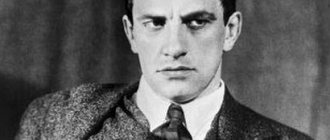early years
Mozart was born into a musical family, and his talent was discovered at a very early age. His father, Leopold, taught him to play instruments such as the violin, harpsichord, and organ. In 1762, Amadeus, his sister Maria Anna and the father of the family went to give concerts in Vienna and Munich. After that, they go on tour in Germany, and then in Switzerland and Holland. They were a huge success everywhere. Mozart treated his parent with great respect. He said:
Right after God comes the father.
But at the same time, Wolfgang Amadeus grew up to be an independent person:
I don't pay attention to anyone's praise or blame. I just follow my own feelings.
There is no need to behave unworthily here, this is a cardinal issue, the rest will be done on its own. Whoever is the most daring has the best chance.
“I have access to social networks”: Alsou spoke about raising her daughters
Why Pavel Derevianko did not marry the mother of his children, and how he lives now
Nina wrote a letter to her neighbor apologizing for the noise. The pensioner's answer was surprising
Mozart began writing music at the age of ten, and it amazed listeners with its beauty. His works were first published in Paris. In the period 1770-1774, the composer lived in Italy, where his operas were first staged and enthusiastically received by the public. The first of them is “Mithridates”. By the age of seventeen, the young musician had more than forty major works to his credit.
Russian project
He got up every day at 6 a.m. to save candles and make the most of daylight for work. A great lover of tasty and hearty food, he scheduled all important meetings that promised refreshments for 2 o’clock in the afternoon, that is, during lunch. He also had one more sin - a passion for fashionable and beautiful clothes. When, after his death, the property was assessed for debts, only a small part was for musical instruments. The lion's share is outfits. At times, music was not creativity for him, but hard work. Six children. Each written note is a piece of bread and a sip of milk. Alas, only two survived.
Article on the topic
Killer success. Mozart was jealous of Salieri and wanted him dead. He rented the best apartments for his family: “Children need space and light!” But in the most spacious apartment, the Mozart couple were once caught doing a strange activity. They danced, hugging each other closely. “We’re warming ourselves,” the composer explained innocently. “Only the nursery is flooded, but Constance and I will make do.”
Mozart even considered the option of moving to Russia. Here is evidence of how Europeans and Russians treated him. Composer Giuseppe Sarti: “His quartets are music to quickly plug your ears.” Russian Ambassador in Vienna, Count Andrei Razumovsky : “There is not a single composer in Europe equal to Mozart.”
"The Last Hours of Mozart's Life", painting by G. N. O'Neill, 1860s.
Razumovsky, impressed by the opera “The Magic Flute,” even began negotiations with Mozart about the position of court conductor. It was supposed to buy an estate near Ekaterinoslav (now Dnepropetrovsk), the income from which would go to the musician. If everything had worked out, then now we could say: “Mozart is a Russian composer of German origin.” But by that time, the “Divine Amadeus” was hopelessly ill with “rheumatic inflammatory fever,” complicated by a general weakening of the body - a consequence of serious illnesses suffered in childhood and adolescence and associated with hard work. He died at the age of 35, and the funeral, organized according to the third category, corresponded, according to the laws, to a “burgher of average income” - 8 guilders 56 kreuzers plus 3 guilders for a hearse.
Creativity flourishes
In the years 1775-1780, Wolfgang Amadeus Mozart created many outstanding compositions. In 1779 he became court organist. In 1782, he married Constance Weber, whom Amadeus loved very much and who had a great influence on his work. In particular, after his marriage, he wrote an opera called “The Abduction from the Seraglio,” imbued with the romance of that period. The attitude of the great composer towards his wife can be judged by the following statements:
Kristina Asmus told how one of her working days went
What do children look like when the mother is Russian and the fathers are of different nationalities: photos of sisters
The little star of “Twilight” is 20 years old: what the actress who plays Renesmee looks like
Neither a high degree of intelligence, nor imagination, nor both together create a genius. Love, love, love is the soul of genius.
I have a wife, Constance! She is my castle, my herd of thoroughbred horses, my mistress and my bunch of children.
And here is what he wrote to her in his letter of will:
Think of me, love me forever, as I love you, and you will be mine forever, as I am yours. Goodbye. Catch them, catch them - these three most tender kisses that just flew out of here.
He did not have time to finish some of the composer's operas due to lack of funds. He constantly had to earn extra money: performing piano concerts, teaching, writing plays and waltzes to order.
In subsequent years, the composer's fame did not fade. His operas are staged with great triumph in various cities. Among them, for example, “The Marriage of Figaro”, as well as “Don Giovanni”, “The Magic Flute”. Mozart treated music with great trepidation:
Taking large amounts of vitamin D without a doctor's prescription harms your kidneys
Astronomers have assessed the danger of a giant asteroid approaching Earth
Fans saw Nikita Mikhalkov’s grandson, Alexander, for the first time
Work is my first pleasure.
I don't hear parts of the music sequentially in my imagination, I hear it all at once. And this is a pleasure!
Music is the silence that lives between sounds.
Music, even depicting something terrible, should not offend the ear, but should give pleasure, that is, remain music all the time.
Beginning in November 1791, the composer began to get very sick and did not even get out of bed. He died in December of the same year, suffering from an acute fever.
Mozart - “vile music” or “music of the gods”? The strange power of Amadeus
265 years ago, on January 27, 1756, in the city of Salzburg, which was then the capital of an independent principality-archbishopric, a boy was born. They named him Johann Chrysostom Wolfgang Theophilus . Subsequently, he will slightly correct this name, translating its last part from Greek to Latin. The result of the translation, Amadeus, leaves no doubt about who we are talking about. Of course, this is Mozart .
It is believed that Mozart now seems to hold the palm in terms of frequency of performance of works on planet Earth. Every 6 minutes, something from his considerable legacy is played in the world: 20 operas, 17 masses, about 50 symphonies, a lot of different little things, for example, 22 sonatas for harpsichord, 15 cycles of variations for piano... A total of 626 works are published. However, regarding the palm of primacy, one can say that “it seems to be”: our Pyotr Ilyich Tchaikovsky is not inferior to Mozart in terms of frequency of performance, and at times even takes the lead.
Portrait of six-year-old Wolfgang in a suit given by the Empress. Unknown artist, presumably Pietro Antonio Lorenzoni, 1763
Another question is that Pyotr Ilyich himself would never have even thought of seriously competing with Mozart, whom he revered as the undisputed pinnacle of the art of composition, reaching in one of his articles to the almost blasphemous statement: “His works are the music of Christ. Mozart is the musical Christ."
In short, it is quite dangerous to doubt that Mozart is a kind of pinnacle. Nevertheless, such hunters existed before and exist now.
Article on the topic
Mozart and his "team". Five poisonings that never happened
The famous Russian composer and music critic Caesar Cui , who was a member of the “Mighty Handful” community along with Mussorgsky and Rimsky-Korsakov , had his own opinion about Mozart: “His Don Giovanni is an outdated and boring opera...” And he also wondered why at all perform the works of this author and waste the energy of Russian artists on the “dead, wooden sounds of Mozart with minor exceptions.” In general, Cui called Mozart’s legacy “the dust of time that stains your hands.” For this he received a stern rebuke from the classic of Russian literature Ivan Turgenev : “Mozart’s melody flows for me completely naturally, the way some beautiful stream or source flows... But Mr. Cui still needs to be killed for his foul language about Mozart, breaking his empty head with a dirty stone, and then throwing him into the same pit with all these..."
How did Theophilus become Amadeus and what is Salieri’s fault? 10 facts from the life of Mozart Read more
One can only imagine what terrible punishments Turgenev would threaten the composer Giuseppe Sarti , who stated: “His quartets are music to quickly shut up one’s ears.” However, Ivan Sergeevich would hardly have reached him: Sarti was a contemporary of Mozart. Moreover, he is Italian, which explains a lot. In Italy they were very jealous of the successes of other Europeans in the musical field and did not recognize Mozart at all. In particular, his opera “The Magic Flute”, which was described in literally two words: “Musica scelerata”. Literally translated: “Vile music.”
Wolfgang Amadeus's compatriots sometimes spoke out no less harshly. The famous music lover Karl Zinzendorf kept a diary where he recorded his impressions of the musical events of Vienna. Here are some of his reviews of Mozart’s works: “July 30, 1782 in the evening at the theater “The Abduction from the Seraglio.” All the music was stolen. <…> May 1, 1786. At 7 pm in the opera “The Marriage of Figaro”. I'm bored with opera. <…> July 4, 1786. Mozart’s music is strange - hands without a head.”
But, perhaps, the coolest thing about Mozart was the Canadian pianist Glenn Herbert Gould , whose mother was the great-niece of the famous Norwegian composer Edvard Grieg . He repeatedly admitted his dislike for Mozart: “There are some things from his early work that I still admire: works such as Seraglio, for example. True, they fly into one ear and fly out of the other, but as background music I can tolerate them... As for the late Mozart, we can say that his works like “The Magic Flute” or the Symphony in G minor are okay, They deserve nothing but contempt. This is a composer who has arrived at the end of his path to mediocrity. They say he died too early. I am sure that he died rather too late: I can’t even imagine where he would have slipped if he had lived to be seventy! You can often find wonderful musicians and conductors who are nothing more than the result of two centuries of admiration for Mozart... It is quite difficult to confront these people with the fact that all these years people believed in the wrong God.”
These statements are, of course, highly controversial. Nevertheless, in the finale everything is put into place. Gould, following Tchaikovsky, almost directly calls Mozart a god, albeit a “wrong” one. This is actually confirmed in one interesting episode related to ethnography.
Article on the topic
Another Tchaikovsky.
Every 6 minutes a work by the composer French writer and scientist Alain Guerbran in 1948-1950. led an ethnographic expedition that worked in South America, in the Orinoco and Amazon river basins, and was engaged in the study of local tribes who actually lived like our distant ancestors from the Stone Age. This is how he described the effect of Mozart’s music on the Makiritare Indians: “When Diego finished singing, we staged our Mozart symphony. It produces a magical effect on the Indians. Even young women could not resist her. Overcoming fear, one after another they emerged from their huts and sat down to listen... There is an elusive witchcraft in Mozart's music, and in the most literal sense. It acts like a mysterious potion that no Indian can resist. For them, this recording produces a calming effect: the body relaxes, and it seems that the soul itself is breathing... But his music does not numb people. It reveals the hidden depths of existence... When the last sounds of the symphony sounded, the leader of the tribe suddenly turned to me and said: “Since you have sacred music, I can reveal to you the innermost secrets.” This is how we learned the story of the birth of the gods of the Makiritare tribe and their coming into the world. If it weren't for Mozart, this might not have happened."
Interesting Facts
The following is known about Wolfgang Amadeus Mozart:
- He started writing music while still a child. He created a harpsichord concerto at the age of four. The first symphony was written at the age of seven, and the first opera at twelve.
- The composer was buried in a common grave, since he was not one of the noble and wealthy people who, after death, were entitled to a separate grave with a tombstone or monument.
- There is scientific evidence that Mozart's light and harmonious works have a positive effect on people's mental functioning, helping them to be more concentrated and think logically.
Found a violation? Report content
Legend 2. Mozart was forced to study music
Verdict: This is not true.
Mozart's childhood. Painting by Ebenezer Crawford. 1873 Jersey Museum and Art Gallery
Leopold Mozart was a progressive and talented teacher, so he raised people not with sticks, but with carrots. His educational principle required time, endurance and dedication to his work: this is how he managed not to damage the student’s gift with rude interference. He never used corporal punishment on children. At the same time, in the eyes of Wolfgang, his father’s authority was indisputable - he almost prayed to him, claiming that “the Pope immediately follows the Lord” Mozart to his father in Salzburg. March 7, 1778 // Mozart Wolfgang Amadeus. Complete collection of letters. M., 2006.. His father, in turn, saw a genius in him.
Wolfgang so impressed his parents with his gift that he was rather spoiled. Johann Adolf Hasse, one of the famous composers of that time, even feared: “If only his father did not spoil him too much and spoil him with the incense of exaggerated praise” G. Abert. W. A. Mozart. Book 1. Part 1. M., 1987..
Legend 9. Mozart had many women
Verdict: This is probably not true.
Wolfgang Amadeus and Constanze Mozart. Postcard by Hans Prinz Bibliothèque nationale de France
We cannot reliably judge this, because the only source of information remains Mozart's letters - mainly to his father. 27-year-old Wolfgang Amadeus wrote to Leopold:
“In no way can I live like most young people today. - Firstly, I am too committed to religion, secondly, I am too full of love for my neighbor to seduce an innocent maiden, and, thirdly, I experience too much horror and disgust, fear and fear of illness and too much love for my health to get involved with prostitutes; At the same time, I can swear that until now I have not had affairs of this kind with any special female person - for if this had happened, I would not have hidden it from you...” Mozart to his father in Salzburg. December 15, 1781 // Mozart Wolfgang Amadeus. Complete collection of letters. M., 2006.
However, perhaps Mozart was not completely honest with his father, knowing about his strict religious and moral principles. Before leaving Salzburg, he was under constant parental supervision and, having escaped from guardianship, immediately fell in love.
Mozart and Aloysia Weber. Illustration by Karl Roechling. Until 1920 sofaithfulaheart.blogspot.com
Judging by Mozart’s letters, the singer Aloysia Weber, whom he planned to marry, hoped with his help to receive lucrative contracts in Italy. Wanting to help his beloved’s career, Mozart wrote several works for her. Having settled into the opera troupe, Aloysia lost interest in him, and then Wolfgang’s cousin, Maria Anna Tekla, acted as a comforter. The nature of their relationship and the degree of closeness are not fully understood, but the “letters to my little cousin” became notorious in Mozart studies because of their obscenities, which, however, did not go beyond the boundaries of toilet humor.
Constanza, who became the composer’s wife, was Aloisia’s sister and also a singer. Mozart's biographers are, at best, indifferent to the story of Constanza, since, unlike her sister, she did not achieve artistic success and did not in any way influence her husband's work. Apparently, Mozart was happy in this marriage, despite various darkening circumstances, primarily the death of four children.
Legend 6. But he didn’t know how to manage money and lived very poorly
Verdict: This is partly true.
Alcove. Banquet table in honor of Mozart in the Schikaneder house. Engraving after a painting by August Borkmann. 1879 Depicted are Haydn, Albrechtsberger, Mozart, Antonio Salieri, Caterina Cavalieri, Schikaneder, Aloysia Lange, Gluck.
austriasites.com The extreme poverty of the composer is a myth. It was created by Constanze Mozart, who, after the death of her husband, asked for help from his influential acquaintances. We managed to pay off the debts quite quickly, which means there weren’t very many of them.
However, Mozart really did not manage money very skillfully, although he constantly tried to convince his father of the opposite. He spent all his earnings on renting expensive housing in the center of Vienna, on maintaining servants and his own team, on guests, on clothes for himself and his beloved wife, on regular grooming that met the requirements of the court. He played the wedding in the main Viennese Cathedral - St. Stephen's. In the last years of the composer’s life, Constanza visited an expensive resort, which constituted a separate expense item. It is difficult to say whether the treatment was a necessity or as much a tribute to fashion as expensive clothes.
Mozart could not control not only his expenses, but also his income. He clearly missed out on royalties from many theaters that staged his operas. Copyright was not carefully observed at that time, and Mozart did not like and did not know how to track debtors. He loved and knew how to compose and perform music - and spent all his time on it. In the last four years of his life, his financial situation worsened. But not through the fault of Mozart himself: Austria entered the war, which led to an economic crisis. Patrons became less generous, and the composer did not live to see better times.
Legend 7. Mozart stole other people's ideas
Verdict: This is not true.
Mozart composes. Painting by Josef Büche. Around 1880 moderata.ru
Originality began to be considered the main virtue of music after Mozart's death: the motto of the Romantic Age was the idea of inventing musical material. And in Mozart’s contemporary culture, ideas about one’s own and others’ ideas and about plagiarism have not yet been formed. The basis of creativity was work based on models - such a model could be a genre, style, or even a musical theme composed by someone. Therefore, the historical style of this era is now more recognizable than the individual styles of individual authors.
Geniuses, myth-makers and virtuosos: who created the music of romanticism
Why Wagner, Paganini, Berlioz and others deified themselves and at the same time were able to reach the soul of every listener
Mozart worked with a huge amount of what he heard and played; borrowing was for him a dialogue with other composers and other works. Now we do not always read the wit of this dialogue. Many authors important to Mozart have been forgotten, and his music has become a symbol that summarizes the entire era.
Legend 3. Mozart immediately became a child star and performed throughout Europe
Verdict: It's true.
The Mozart family gives a tour in Paris. Watercolor by Carmontelle. 1763 Musée Condé
Leopold Mozart was the father of two child prodigies: Nannerl Nannerl is the pet nickname of Wolfgang's older sister, and her full name is Maria Anna Walburga Ignatia Mozart, Wolfgang's older sister, also grew up as a promising performer. Their first tour began in January 1762, when the younger Mozart was six years old and his sister was ten. Although Munich, where they went, is not far from Salzburg, it was still a real tour. At the court of the Elector the Elector is an electoral prince in Germany, vested with the right to elect the vacant imperial throne. They spent three weeks in Maximilian III Joseph's Bavaria.
Together with his sister, Wolfgang traveled to all the musical capitals of Europe. Just six months after the Munich triumph, the father and his children went to Vienna. At one of the stops, they gave the first public concert in their lives, and in Vienna a whole series of performances awaited them: at the court of Maria Theresa, and in aristocratic salons, and in the homes of foreign ambassadors. Then they received an offer to perform at Versailles. At the beginning of the summer of 1763, the entire family went on a three-year tour of Europe: Munich, Augsburg, Ulm, Ludwigsburg, Bruchsal, Mannheim, Schwetzingen, Frankfurt am Main, Koblenz, Bonn, Cologne, Aachen, Brussels and finally , Paris and Versailles. These are just the cities in which they gave concerts. The main purpose of the trip was to receive Louis XV at Versailles. And the next goal was London. George III was so delighted with the performance that he wished to hear the prodigies again at the celebrations on the occasion of the next anniversary of his accession to the throne.
After almost a year's stay in England, the wanderings continued: Canterbury, Calais, Lille, Ghent, Antwerp, The Hague, Amsterdam, Utrecht, Antwerp. Again Brussels, Paris, Versailles, Dijon, Lyon, Geneva, Lausanne, Bern, Zurich, Donaueschingen and finally Munich and Salzburg again. Wolfgangerl returned home a famous musician who performed for kings. On the eve of his fourteenth birthday, the family travels to Italy. The second and third Italian journeys, on which only the male part of the Mozart family went in 1771 and 1772, were triumphant. Europe was conquered, and with it the entire musical world.





